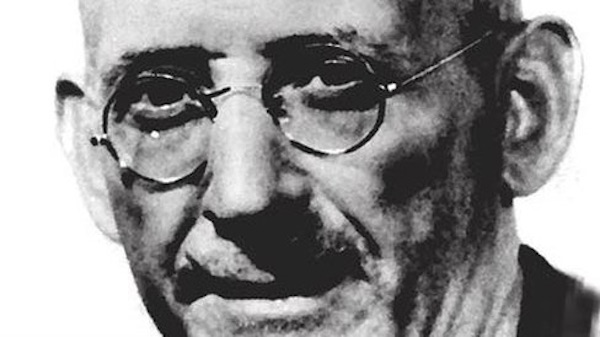
President Michael D Higgins has said that an apology is due to Jimmy Gralton, the only Irish person deported by an Irish government.
Speaking as he unveiled a memorial at the birthplace of the Leitrim socialist in Effrinagh, County Leitrim last weekend, the President was cheered as he condemned “the wrongful intimidation and ultimate deportation by an abuse of the law, of Jimmy Gralton, to whose memory, and whose family, an apology is due”.
Addressing members of the Gralton family who were joined at Saturday’s ceremony by trade union leaders, politicians and hundreds of local people, President Higgins said: “Jimmy Gralton’s treatment at the hands of the Irish State and its agencies in 1932 was wrong and it is indefensible, and I hope that even at this distance of time the recognition that is being afforded to him today will remove any lingering stain on his fine character”.
Eighty-one years ago James Gralton became the only Irish citizen to be deported from his own country. It happened without trial, in August 1933, on the grounds that he was a dangerous subversive and a communist, although no evidence was ever produced to back up the suspicions of Eamon de Valera’s government.
It is one of the more shameful episodes in the infancy of the Irish Free State. The Catholic Church and compliant politicians ensured that Jimmy Gralton would be hunted, as his mother put it, “like a wild deer”. After six months on the run he was caught by the Garda, taken to Cobh and put on a steamer to the United States without a chance to say goodbye to his mother.
The story of Jimmy Gralton is in many ways the story of the State. Born into poverty, in Effrinagh, outside Carrick-on-Shannon in 1886, he was bright but had no formal education, and he left school at 14. By 21 he had seen the world with the Royal Navy. He went to the US, where he became radicalised in union politics. He came back to Ireland in 1921, just before the Anglo-Irish Treaty was signed, and built the hall on his father’s land - used for dances and education - that is now the subject of Loach’s film.
Radicalism Gralton became involved in land agitation, but his radicalism was too much for the local IRA. He went back to the US in 1923. He returned to Ireland in 1932 when de Valera took office and joined Fianna Fail, believing it would be a radical alternative, but he quickly resigned.
Nineteen thirty-two was the year of the Eucharistic Congress in Ireland. Religious fervour and a strong anti-communism emanated from both church and State. A Lenten pastoral urged violence against anyone who preached communism. Gralton’s building, named Pearse-Connolly Hall, burned to the ground on Christmas Eve 1932. Suspicion fell on the local IRA, incited by clergy.
The rhetoric against Gralton increased in intensity in 1933. He was denounced repeatedly by local priests and politicians. One of his most vocal critics was Andrew Mooney, then an Independent member of Leitrim County Council, who during a debate about Gralton was reported to have said, “I suggest we should get Hitler over here for a few days.”
Mooney’s grandson Paschal, the Fianna Fail senator, says Gralton’s deportation cast a long shadow over his family. “I never knew my grandfather, but I remember my Uncle Padraig, who said that he had been quite upset down through the years about how his father [Andrew Mooney] had been vocal in his criticism of Jimmy Gralton at the time. It affected my uncle so much that in his later years he wrote to the Gralton family, apologising for any hurt that his father had caused.”
Mooney says the Fianna Fail government of the time did Gralton a grave injustice by deporting him. “It was totally and completely wrong, but I wouldn’t judge my grandfather’s decisions by the mores of today. You are talking about a deeply religious, conservative country.”
Gralton is the subject of renowned film-maker Ken Loach’s feature film, Jimmy’s Hall, which was released two years ago. Loach describes it as “the story of a socialist who believed he had to liberate the human spirit as well as achieving economic demands . . . It’s a heroic story.”
Paul Laverty, who wrote the screenplay, came across the story in 2011. It is no coincidence, he says, that Gralton’s story is not more widely known. “What’s amazing is that when I went to the historical records office, nothing exists; there’s no paper trail,” says Laverty. “It did remind me of that subversive opening to Milan Kundera’s novel The Book of Laughter and Forgetting: ‘The struggle of man against power is the struggle of memory against forgetting.’ “‘
The bitterness surrounding Gralton’s deportation lingered for decades. Most of his contemporaries are now dead, but two documentaries, both online, give gripping accounts of the time. One is an RTE programme from 1977, the other a film made by Michael Carolan, ‘Deported: The Gralton Story’, that was never broadcast on television but is available on YouTube.
Supporters of Gralton raised the money to erect a monument at the site of Pearse-Connolly Hall. John Feely, a local Labour Party activist, says he knew nothing about Gralton growing up. “I inquired to an uncle about Gralton, and he said, ‘He was the fellow who told the people not to say the angelus.’ There was a genuinely held belief even decades afterwards that Gralton was the Antichrist.”
![[Irish Republican News]](https://republican-news.org/graphics/title_gifs/rn.gif)
![[Irish Republican News]](https://republican-news.org/graphics/title_gifs/harp.gif)

